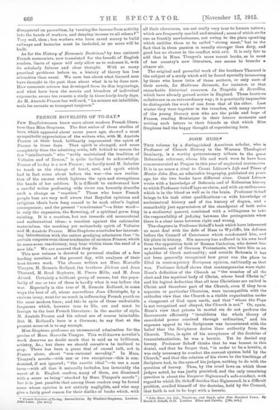FRENCH NOVELISTS OF TO-DAY.'
Few Englishwomen know more about modern French litera- ture than Miss Stephens. The first series of these studies of hers, which appeared about seven years ago, showed a most sympathetic appreciation of the writers who, with M. Anatole France at their bead, brilliantly represented the spirit of France in those days. That spirit is changed, and more completely than the admiring critic, left behind to mourn the few "intellectuals" who "nobly maintained the tradition of Voltaire and of Rena,n," is quite inclined to acknowledge. France of to-day is a new France; we hardly need M. Sabatier to teach us the change of heart, soul, and spirit which bad in fact come about before the war—the new realiza- tion of the unseen which lightens the eyes and strengthens the hands of her soldiers. It is difficult to understand how a careful writer professing wide views can honestly describe such a change as "reaction." Those who know French people best are very well aware that Royalist opinions and religious ideals have long ceased to be each other's logical consequence; and the present " renaissance "—a fitter word— is only the expansion, the flowering, of a spiritual germ long existing. It is a reaotion, but not towards old monarchical and ecclesiastical ideas: a reaction against the rationalist materialism, the mocking yet melancholy spirit of Voltaire and U. Anatole France. Miss Stephens concludes her interest- ing introduction with the rather grudging admission that "in certain respects even those tendencies of modern France, which to some seem reactionary, may bear within them the seed of a new life." We are assured that they do. • This new volume is devoted to personal studies of a few leading novelists of the present day, with analyses of their best-known work, The chosen writers are Mme. Marcella Tinayre, M. Romain Rolland, the brothers Jerome and Jean Tharand, M. Rene Boylesve, M. Pierre Mille, and M. Jean Aicard. Certainly a brilliant group of names, but the popu- larity of one or two of them is hardly what it was before the war. Especially is this true of M. Remain Rolland, in some ways the beet of all, whose marvellous Jean Christophe, by a curious irony, went for so much in influencing French youth on the most modern lines; and this in spite of those undeniable longuewrs which, however true to life, are and must be foreign to the best French literature: in the matter of style, M. Anatole France and his school are of course inimitable. But M. Rolland's hero is a German; to say that at the present moment is to say enough.
Miss Stephens professes an unmeasured admiration for the
genius of Mine. Marcell. Tinayre. This well-known novelist's work deserves no doubt much that is said as to brilliance, artistry, &o.; but there we should oueselvea he inclined to stop. There has been a great deal of unreal talk, not in France alone, about "con, entional morality." In Mme. Tinayre's novels—with one or two exceptions—this is con. demned, if not ignored; "the ascetic ideal "—to use a cant term—with all that it naturally includes, has invariably the worst of it. English readers, many of them, are dismissed with a sneer as being " shocked by M me. Tinayre's novels"; but it is just possible that among these readers may be found some whose opinion is not entirely negligible, and who may give a fairly good reason for their dislike of books which, with • Prenok Nowetiste af Toalay: Seeond Series. By Winifred Stephens, London: John Lane. [as. nob.] all their cleverness, are not really very true to human nature; which are frequently morbid and strained; some of which strike one as frankly unwholesome, not owing to the plain speaking which entitles them to be called " strong meat," but to the fact that in them passion is usually stronger than duty, and good has no chance in the conflict with evil. It is only fair to add that in Mme. Tinayre's more recent books, as in most of her country's new literature, one seems to breathe a clearer air.
The original and powerful work of the brothers 'Maraud is the subject of a study which will be found specially interesting by those who know little of those authors, or only such of their novels, La Maitresse Servants, for instance, or that remarkable historical romance, La Tragedia de Rovailloo, which have already gained notice in England. These brothers collaborate in an extraordinary way; it is practioally impossible to distinguish the work of one from that of the other. Lent winter they were together in the trenches, with many another of the young literary men who are the pride and hope of France, reading Montaigne in their leisure moments and writing such letters to their friends as that which Miss Stephens had the happy thought of reproducing here.






































 Previous page
Previous page